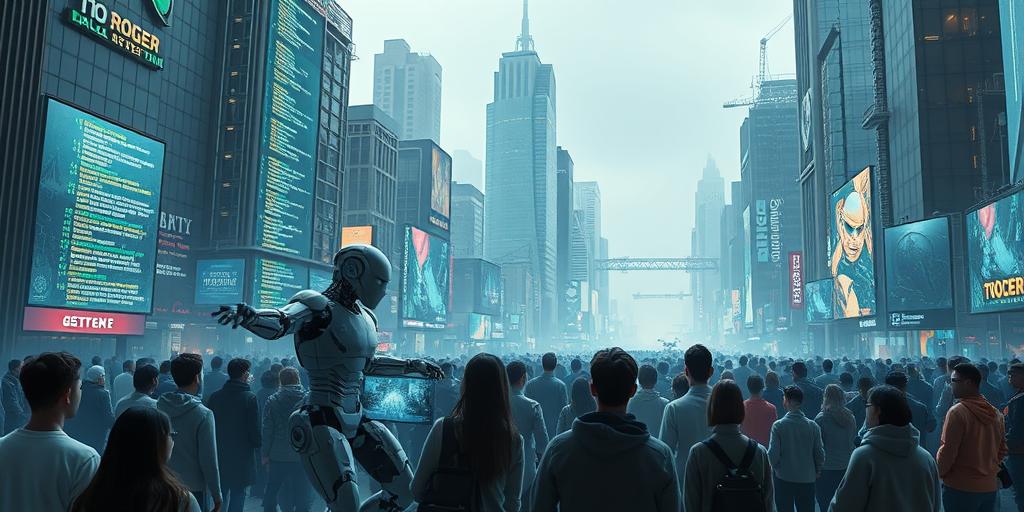The world of gaming is experiencing a seismic shift, driven by the rapid advancements in artificial intelligence (AI). AI Games are no longer just a futuristic concept; they’re becoming a reality, transforming the way we design, play, and even experience video games. From AI-powered game design to self-playing video games, the impact of AI on the gaming industry is undeniable.
The Rise of AI in Game Development
AI’s influence on the gaming industry is pervasive, encompassing various aspects of game development. Let’s delve into the key areas where AI is making its mark:
AI-Powered Game Design
AI is revolutionizing game design by taking on tasks that were previously time-consuming and resource-intensive. AI algorithms can analyze existing games, identify patterns, and generate new game mechanics, levels, and even storylines. This allows game developers to explore innovative concepts and create more engaging and diverse gaming experiences. For instance, AI can be used to create procedurally generated levels, ensuring that each playthrough is unique and fresh. Imagine a game where the environments and challenges adapt to your play style, constantly evolving and keeping you on your toes.
AI-Driven Gameplay Mechanics
AI is not just about designing games; it’s also about enhancing gameplay mechanics. AI can be used to create intelligent enemies that adapt to your tactics, respond to your movements, and even learn from their mistakes. This creates a more dynamic and challenging gameplay experience, where every encounter feels unique and engaging. Moreover, AI can be used to create realistic and engaging non-player characters (NPCs) that have their own personalities, motivations, and goals.
AI-Generated Content
AI can generate a wide range of content for video games, including levels, textures, soundtracks, and even dialogue. This allows game developers to create more immersive and engaging worlds, without having to spend countless hours manually creating every asset. Imagine a game where the soundtrack dynamically adapts to your actions, adding to the emotional impact of the game. AI can also be used to create dialogue that feels more natural and realistic, enhancing the storytelling and character development.
AI-Powered Games That Play Themselves
The most exciting application of AI in gaming is the creation of self-playing video games. These games utilize AI to control the characters and make decisions, effectively playing the game on their own. While this concept may seem counterintuitive, it opens up a whole new realm of possibilities for the gaming industry.
Procedural Generation and Level Design
AI-powered procedural generation is key to creating self-playing games. Algorithms can generate unique levels, environments, and challenges on the fly, ensuring that each playthrough is different. This allows for endless replayability and keeps the game fresh and exciting. For example, a game could be set in a procedurally generated world, where the landscape, weather, and even the inhabitants change with each playthrough.
AI-Controlled Characters and NPCs
AI-controlled characters and NPCs are essential for self-playing games. These AI agents must be able to navigate the game world, interact with other characters, and make decisions that are consistent with their goals and objectives. Imagine a game where AI-controlled characters engage in complex storylines, forming relationships, and pursuing their own agendas, creating a dynamic and unpredictable gaming experience.
Adaptive Difficulty and Gameplay
AI can also be used to create adaptive difficulty levels that adjust to the player’s skill and progress. This ensures that the game remains challenging but not frustrating, allowing players to enjoy the game at their own pace. Imagine a game where the AI dynamically adjusts the difficulty level based on your performance, providing a personalized and engaging experience.
The Future of AI in Gaming
The future of AI in gaming is bright, with exciting possibilities on the horizon. AI is poised to revolutionize the way we play, design, and even experience video games.
Personalized Gaming Experiences
AI can be used to create personalized gaming experiences tailored to each player’s preferences and play style. Imagine a game that learns your preferences, adjusts its difficulty level, and recommends content that you’ll enjoy. This could lead to more engaging and immersive gaming experiences, where players feel like they’re part of a unique and personalized world.
Emergent Gameplay and Storytelling
AI can also be used to create emergent gameplay and storytelling, where the game evolves based on the player’s choices and actions. This could lead to truly unique and unpredictable gaming experiences, where players never know what to expect next. Imagine a game where the story branches and unfolds based on your decisions, leading to multiple endings and a truly personalized experience.
The Ethical Implications of AI in Games
While AI offers immense potential for the gaming industry, it’s important to consider the ethical implications. AI-powered games could raise concerns about privacy, data security, and the potential for bias in algorithms. As AI becomes increasingly integrated into the gaming industry, it’s essential to develop ethical guidelines and ensure that AI is used responsibly and ethically.
AI Games are not just a technological advancement; they represent a fundamental shift in the way we interact with video games. From AI-powered game design to self-playing games, AI is transforming the gaming industry and creating exciting possibilities for the future. As AI continues to evolve, we can expect to see even more innovative and immersive gaming experiences, pushing the boundaries of what’s possible in the world of gaming.




